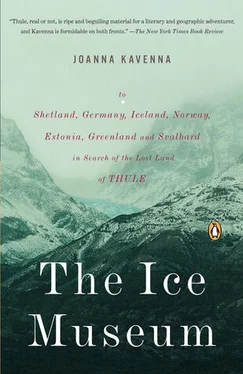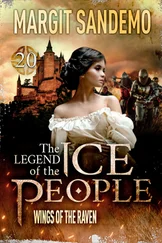Shetland was a place where the peat plains had preserved traces of the distant past, the shapes of houses and forts embedded in the soft ranges. At the edge of Lerwick, beyond the grey pebbledash buildings and the painted wooden housing estates, there was the Loch of Clickhimin and a low knoll. On the knoll were stone ruins, older than the Roman tales of Thule, older than Pytheas’s first sighting of the mystery island in the north. The first settlers came to Shetland thousands of years before the Roman invasion of Britain. Long before Pytheas sailed, these settlers came from Orkney in skin-covered open boats, across the blistered sea. Remains were found near Sumburgh, in the south: smashed bones and fragments, hammerstones and beads.
These settlers lived quietly in small stone houses, growing grain, fishing, tending cattle, leaving their litter across the peat plains—their ploughshares, discs and stone balls, pendants, pins, rings in bronze, glass beads, bone pins and antler necklaces. They left ruins scattered across the land, the cracked remnants of their houses, preserved in the spangled cotton-grass and the low plains of moss. There was one wall at Clickhimin, sunken in the earth, and the circular walls of a stone tower, built around the time the Romans came to Britain. The stone tower had supplied protection against enemies, but no trace remained of the reasons for their wars. Grass had grown around the rim of the tower; the roof lay open to the sky. For millennia, these brochs stood, scattered along the coasts, turrets on wind-lashed islands. Looking out at the sea or across the hills and bogs gashed with deep earth cracks.
Stones lay littered across the fields: low walls that were once houses, built thousands of years ago, overgrown with moss. Driving through soft valleys, where the sun chased the shadows across the hills, I found a gate singing in the wind, and an oval-shaped ruin a few feet high, which might have been a temple, or a village hall, or a burial chamber. To the eerie song of the gate, I stood at the edge of the building, finding I was reluctant to walk inside. The external outline was almost complete, the shape of the building preserved in the ruined walls. All the forgotten worshippers, dancers, villagers, or farmers would have seen were the matted green hills, stretching away. The sea was invisible, making the site unusual in Shetland, where the sea is never more than a few miles away. But the significance of the location was lost, and nobody knew for certain what the building had been used for, what forgotten protocol or practices it had embodied. These islands were covered with these low walls of stone, the moss-coated debris of thousands of years ago. The people lived quietly along the coasts, and the winds blasted symphonies across the rocks and the waves drummed on the sands.
Later, I went back to the Thule Bar, running into the bunker building as the rain fell in sheets. I sat on a chrome stool by the bar, my clothes dripping on the floor, but no one minded. The locals were jovial and polite, speaking in their thick Scots-Scandinavian accents, but even after a few beers, they still weren’t sure that Shetland was Thule. Like a consortium of pedants, they were careful with the past, refusing to leap to a conclusion.
‘But what about the Romans?’ I said, speaking above the sound of the bar. ‘What about the Romans arriving two thousand years ago, saying that the north of Britain must be Thule?’ They were nodding politely, looking blank. ‘The Roman historian Tacitus,’ I said, causing a Shetlander to upset his glass, ‘said that Thule was Shetland.’
‘Tacitus!’ someone bellowed across the bar, as if he were proposing a toast.
Tacitus placed Thule north-east of the Scottish mainland, and gave the credit for finding it to his father-in-law, Agricola. Agricola sent out the fleet which found Thule, wrote Tacitus, on a mission to circumnavigate Britain, and his fleet had seen Thule across the torpid waves of Ocean. Britain, wrote Tacitus, was the largest land known to the Romans: its northern shores had no lands opposite them, but were beaten by the wastes of a vast empty sea. In A.D. 77, Agricola became governor of Britain, taking up the post at a time when the land remained uneasy. In the years after he arrived, Agricola moved his armies north. The soldiers, wrote Tacitus, were prone to bragging, claiming that their battles against the local tribes were as mythical as the conquest of Ocean.
There were skirmishes between the Romans and the Caledonians, and then the armies faced each other for a major battle. Tacitus reports the speech one of the Caledonian leaders made, a speech curiously laden with a Roman sense of Britain as the last land to the north: ‘There is no land beyond us and even the sea is no safe refuge when we are threatened by the Roman fleet,’ he said, according to Tacitus. ‘Today the furthest bounds of Britain lie open—and everything unknown is given an inflated worth. But now there is no people beyond us, nothing but tides and rocks and, more deadly than these, the Romans . . . They have pillaged the world: when the land has nothing left for men who ravage everything, they scour the sea.’
And Agricola’s rallying cry to his troops drew similarly on notions of remoteness, invoked in order to emphasize Roman supremacy: ‘The furthest point of Britain is no longer a matter of report or rumour; we hold it, with forts and with arms. Britain has been discovered and subjugated . . . And it would not be inglorious to die at the very place where the world and nature end.’ The Roman Army had found out the coward Britons, he said, the Britons who hid in the furthest reaches of their remote country: ‘They have not made a stand, they have been trapped.’
Tacitus claimed that the battle was won by the superior tactics of the Romans; some thousands of Britons were killed, and only a few hundred on the Roman side, he wrote. ‘The Britons dispersed, men and women mingling their cries of grief, dragging off the wounded, calling out to survivors, abandoning their homes and in their rage even setting fire to them, choosing hiding places, and then leaving them again at once.’ The Romans passed a joyful night, delighted at the ‘outcome and the booty,’ and in the morning, under the dawn light, their victory could be seen across the land: ‘the silence of desolation on all sides, the hills lonely, homesteads smouldering in the distance, not a man to encounter the scouts.’ As the summer was over, Agricola decided to stop the battle. He instructed the prefect of the fleet to sail around Britain; forces were allocated for the purpose. Agricola settled the cavalry and infantry in their winter quarters. When he left Britain, he ‘handed over to his successor a province peaceful and secure,’ wrote Tacitus.
The Roman fleet Agricola sent out discovered the islands called Orcades, and ‘Thule also was surveyed; their instructions taking them only so far: besides, winter was approaching.’ Thule was seen, across the capricious Ocean, before the ships sailed southwards. Thule for Tacitus might have been the Shetland Isles. The Roman fleet found their ships were impeded by the sea, as Pytheas’s had been centuries earlier. The obstinate waves, slowing their oars, were further proof, they might have thought, that they had found Pytheas’s Thule—the land in the congealed Ocean.
Through the windows of the Thule Bar, this beer-stained corner of antiquity, I saw only the folds of the mist, and the baroque patterns of the churning ocean, as the rain lashed the glass, and the fog coiled tighter round the town. There was a local who had a fistful of theories, none of them about Thule, and he seemed in a conspiratorial mood. He was wearing a greasy pair of jeans, a crumpled shirt, and his face was ruddy and chapped. ‘I’ve got a good story for you,’ he said. ‘Better than that Thule story you’re talking about.’ He asked the barman for two whiskies, and handed me one. ‘Drink that, it’s a cold gale outside,’ he said.
Читать дальше












